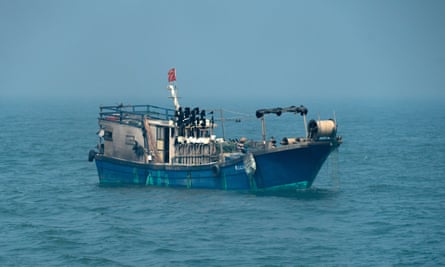Security experts have warned a $200m Chinese-built fisheries plant, proposed for a Papua New Guinean island on Australia’s border, could be exploited as a cover by transnational organised crime networks to smuggle drugs, weapons and people.
The PNG island of Daru, where the fish processing plant is proposed to be built, is just 50km from Australia’s Saibai Island, in the Torres Strait.
“There are criminal entrepreneurs looking at this and saying ‘OK, there’s an opportunity here’,” Dr John Coyne, head of strategic policing and law enforcement at the Australian Strategic Policy Institute, told the Guardian.
“If we have an increase of maritime traffic in the Torres Strait, the idea of a ‘legitimate fishing boat’ leaving Daru as a mothership and then dropping off a large shipment of methamphetamines somewhere for someone from Australia to come out and pick up is a very realistic proposition,” he said.
Dr Henry Ivarature, a PNG national and Pacific lecturer at the Australia Pacific Security College at the Australian National University, said the risk extended far beyond the Torres Strait.
“It would include the land and sea border between Indonesia and PNG and extend along the land border between Indonesia and PNG as far north as Vanimo in the West Sepik Province, and as far east to the National Capital District,” he said.
“It could become the ‘Fly River’ triangle of illegal activities between the three countries.”
Taboi Awi Yoto, the governor of Western Province, said last month after a meeting with an Australian delegation in Daru that all Australia wants “is for us to be subsistence farmers and fishermen and maintain our current status quo”.
“I will not let go of an opportunity to advance the aspirations of my people in my own land, in my own province, in a sovereign nation of my own, to explore the opportunity at hand to advance my peoples’ interest to have an improved standard of living.”

And last week it was widely reported that a letter was sent to the PNG government from a Hong Kong-based company seeking approval for a Chinese-built multibillion-dollar city in Daru. The PNG government told the Guardian the proposal is not being formally considered.
Under the Torres Strait Islands Treaty, Papua New Guineans from a number of islands in the Torres Strait are allowed to fish in Australian waters and visit Australian islands without passports or visas (outside of Covid-19 travel restrictions).
The shared fishing treaty between Australia and PNG has operated successfully since 1985, but Australian law enforcement agencies are aware of the risks posed by the ease of travel between the two countries, announcing as recently as November that they had deployed new underwater technology in the strait to detect illegal activity.
Dyhia Belhabib, the principal fisheries investigator at EcoTrust Canada and the founder of SpyGlass, which maps and publishes the criminal records of fishing vessels, said the use of small fishing vessels in drug trans-shipment has tripled over the past eight years to about 15% of the global retail value of illicit drugs.
Belhabib said in a situation such as the Torres Strait, criminal syndicates would use fishing vessels to blend in.
“Drug trafficking networks are using small fishing vessels because the smaller the vessel, the harder it is to find at sea,” she told the Guardian.

Criminal organisations have previously sought to exploit the Torres Strait, and Daru Island itself.
In a 2019 case before the Queensland supreme court, a PNG national pleaded guilty to trafficking and dealing with the proceeds of crime, over a plan to ship $90m worth of cocaine from Daru Island to Australia via the Torres Strait.
The crown prosecutor Ben Power told the court, “because of historical ties with the islands of the Torres Strait and Papua New Guinea proper, there is considerable small boat traffic, and the aim is to exploit that”.
Jose Sousa-Santos, the managing director of Strategika Group Asia Pacific and senior associate of Pacific and Southeast Asia Regional Security at Victoria University, said “if this project goes ahead, and trafficking increases, it will leave a trail of addiction and violence”.
“The Torres Strait has been a drug trafficking route for decades, especially around the Daru area, and always with devastating consequences for local communities, where we’ve seen how the overflow of drugs can lead to corruption in local government and the erosion of traditional power structures,” he said.
Sousa-Santos said there was a blurred line between legitimate enterprises and illicit activities such as human trafficking in industries like fishing.
“When you have large foreign fishing fleets and logging vessels, there is often the risk of human trafficking, especially of women, girls and boys, who might be brought into the sex trade,” he said.
The MoU for the fisheries plant announced by China’s Ministry of Commerce contained few specific details of the proposal. It is not known whether the agreement will allow Chinese-flagged vessels to fish in the region.
“China’s fleet is notorious for its involvement in illegal fishing,” Channing Mavrellis, the director of Global Financial Integrity’s illicit trade program, said, with issues in Ecuador, Colombia, Argentina and Indonesia.
“They’re there largely because their own waters have already been overfished,” she said. “China’s not bringing wooden boats, they’re an extremely efficient operation.”
If seas are overfished, while distant water fleets move on, local fishermen are left behind.
“It’s then much harder to eke out a living and so some fishermen, who have a boat, are skilled at sea and don’t have a job, turn to criminal activity. It’s for need not greed.”
Chinese foreign ministry spokeswoman Hua Chunying, said “as a responsible fishing country, China adheres to the path of science-based conservation and sustainable use of fishery resources” and that China has “zero tolerance for violations of relevant laws and regulations committed by distant fishing vessels”.
